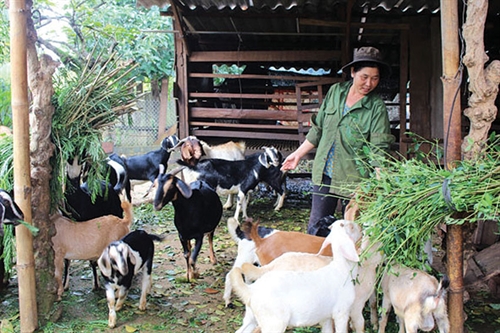
The Ministry of Planning and Investment (MPI) has introduced the latest draft of the law revising the Investment Law and Enterprise Law, which officially acknowledges household business as a type of business entity besides private enterprise, partnership, limited liability company and joint-stock company.
The Ministry of Planning and Investment (MPI) has introduced the latest draft of the law revising the Investment Law and Enterprise Law, which officially acknowledges household business as a type of business entity besides private enterprise, partnership, limited liability company and joint-stock company.
 |
| Nguyen Thi Tan, a farmer in Ea Ral commune, Ea H’leo district, Dak Lak province, feeds her family’s herd of goats__Photo: http://baodaklak.vn |
With regard to the Enterprise Law, the MPI proposes adding a new chapter (Chapter VIIa with five articles, Articles 187b thru 187e) which is designed toward removing all restrictions on household businesses while refraining from using administrative measures to force them to transform into enterprises.
Household business owners would have full powers to decide on all activities of their businesses, represent their businesses, and fulfill tax and other financial obligations of their businesses. Household business owners may directly manage and run their businesses or hire others to do so. However, it is the household business owners who would act as the plaintiff, the defendant or persons with related interests and obligations before arbitration or court in the settlement of disputes related to their household businesses.
A household business would terminate operation if its owner is temporarily detained, sentenced to imprisonment, deprived the right to practice in the relevant profession, dead, or declared by court as missing or having his/her civil act capacity restricted or lost.
Another noteworthy content of the draft is the revision of the current definition of state-owned enterprises (SOEs). Under the 2014 Enterprise Law, an SOE is an enterprise in which the State owns 100 percent of charter capital. The draft now lowers the required state holding to more than 50 percent.
Revising the Investment Law, the draft affirms the principle that ministries, ministerial-level agencies and local administrations may not issue regulations on investment conditions but may only issue documents to provide administrative procedures for conducting investment activities as assigned in relevant laws.
Notably, the MPI proposes adding the debt collection service to the list of sectors and trades banned from investment. Meanwhile, 12 sectors and trades are removed from the list of those subject to conditional investment, including logistics services, commercial franchising, training and re-training in real estate brokerage, debt trading, etc.
The draft also adds some sectors, trades and investment activities to the group eligible for investment incentives. They are R&D activities; production of and trading in products created from scientific research outcomes; innovation activities; production of goods or provision of services to create or join value chains and industry clusters.
Under the draft, the Government may decide to offer investment incentives higher than the prescribed ones in order to encourage the development of a particular sector or geographical area or a specially important project. For example, R&D or innovation center building or expansion projects with a total investment capital of at least VND 6,000 billion (USD 257 million) and projects eligible for special investment incentives which are capitalized at VND 30 trillion (USD 1,3 billion) or higher and commit to disburse at least VND 10 trillion (USD 428 million) in three years would be entitled to higher incentives.





